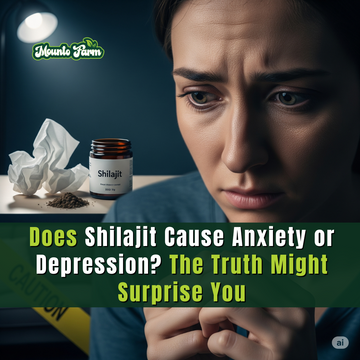Does Shilajit Cause Anxiety or Depression? The Truth Might Surprise You
by My Store Admin on Aug 04, 2025

Shilajit is a natural substance found in the Himalayas and other mountainous regions. Known for its energy-boosting and rejuvenating effects, it’s widely used in Ayurvedic medicine and modern wellness circles. However, while most people take it for its physical and cognitive benefits, concerns have surfaced about its potential side effects on mental health. This article answers a critical question: Does Shilajit cause anxiety or depression?
What Is Shilajit and How Does It Work?
Shilajit is a sticky, tar-like resin formed from centuries-old decomposed plant matter. Rich in fulvic acid, trace minerals, and antioxidants, it supports energy production, stamina, immunity, and cellular repair. Many users also report improved brain function and reduced fatigue.
Its active compounds affect various systems in the body, including the brain and central nervous system. This interaction leads some to wonder whether Shilajit might trigger mental health symptoms like anxiety or depression in certain individuals.
Does Shilajit Cause Anxiety or Depression?
There’s no strong scientific evidence directly linking pure, properly dosed Shilajit to anxiety or depression. In fact, studies suggest that it may have the opposite effect, supporting mental clarity and mood stability. However, anecdotal reports from users indicate that some individuals experience heightened anxiety, restlessness, or mood swings after taking it.
These mixed outcomes highlight a key point: Shilajit affects people differently based on factors like dosage, product quality, and individual health conditions.
How Shilajit May Affect Mental Health
Shilajit influences several processes tied to emotional health:
-
Neurotransmitter Balance: The fulvic acid in Shilajit may help regulate dopamine and serotonin, chemicals that control mood and motivation.
-
Anti-inflammatory Action: Chronic inflammation is linked to depression. Shilajit’s antioxidants may help reduce this risk.
-
Stress Hormone Regulation: Some evidence suggests it may lower cortisol levels, easing stress and tension.
That said, overstimulation or chemical imbalances can occur if it’s taken in excessive amounts or combined with other substances.
Risk Factors: Who Might Experience Anxiety or Depression from Shilajit?
Although uncommon, certain users may be more sensitive to Shilajit’s effects. Risks increase if:
-
You have a history of anxiety or depression
-
You use medications that affect brain chemistry
-
You take more than the recommended dose
-
The product is impure or contaminated
Adulterated Shilajit may contain heavy metals or harmful additives that could provoke negative reactions.
Safe Usage: How to Avoid Negative Mental Effects from Shilajit
To reduce the risk of side effects:
-
Start with a small dose (usually 100–300 mg per day)
-
Only buy from reputable brands that test for purity
-
Avoid combining it with stimulants or other mood-altering supplements
-
Monitor your mood daily and take breaks if necessary
Consistency and moderation are key. If you notice early signs of restlessness, anxiety, or irritability, reassess your intake.
What to Do If You Experience Anxiety or Depression After Taking Shilajit
If you feel mentally unwell after starting Shilajit:
-
Stop using it immediately
-
Track your symptoms over a few days
-
Consult a healthcare provider—especially if symptoms persist
-
Rule out other causes, like diet, sleep disruption, or medication interactions
Don’t ignore changes in your mental state. Taking action early can prevent more serious issues.
Conclusion
So, does Shilajit cause anxiety or depression? For most users, no. When taken in proper doses and in pure form, Shilajit appears to support—not harm—mental health. However, as with any supplement, individual responses vary. People with underlying conditions or sensitivities should proceed with caution. Always prioritize quality, moderation, and medical advice to stay safe.
If you're considering adding Shilajit to your routine, make sure you choose a high-quality, lab-tested product—and always start slow. Your mental well-being matters just as much as your physical health.




